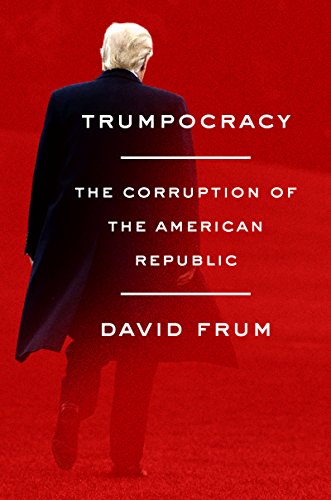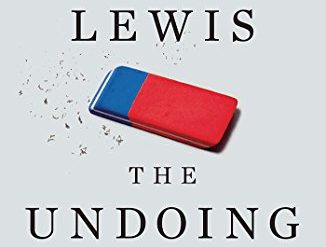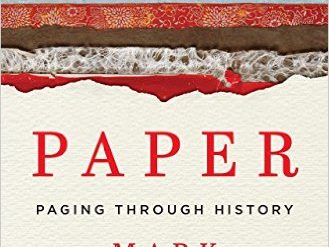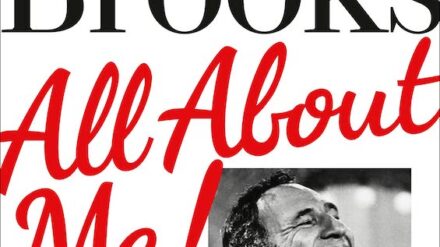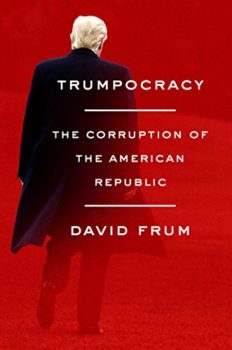
“Trumpocracy has left Americans less safe against foreign dangers, has diverted their money from its proper purposes to improper pockets, has worked to bias law enforcement in favor of the powerful, and has sought to intimidate media lest they report things the public most needs to know.” Thus David Frum sets the stage to explain how Donald Trump corrupts democracy in his new book, Trumpocracy: The Corruption of the American Republic.
If there is any surprise in this line of argument, it lies in the identity of its author. David Frum is a card-carrying conservative, or neoconservative, if you prefer the current jargon. He wrote speeches for George W. Bush and served as a fellow at the American Enterprise Institute. (He is now a senior editor at The Atlantic and a CNN commentator.) What sets Frum apart from today’s kneejerk “conservatives” is that he has been in the Never Trump camp since the New York developer turned reality TV star declared his campaign for the White House.
Blatant corruption and extreme partisanship
In Trumpocracy, Frum methodically surveys the damage Donald Trump and his minions have been inflicting on the American people ever since November 6, 2016. For example, in a chapter entitled “Plunder,” he details the blatant corruption that is enriching Trump and his family. (Frum notes that “the United States ranked a not exactly reassuring eighteenth on Transparency International’s corruption index, behind Hong Kong and Belgium.”) But the author doesn’t place all the blame on Donald Trump personally. “The man inside the oval center did not act alone. He held his power with the connivance of others. They executed his orders and empowered his whims for crass and cowardly reasons of their own: partisanship, ambition, greed for gain, eagerness for attention, ideological zeal, careerist conformity, or—in the worst cases—malicious glee in the wreck of things they could never have built themselves.”
Trumpocracy: The Corruption of the American Republic by David Frum ★★★★★
Frum is clearly convinced (as am I) that Donald Trump is in the White House “in some considerable part by clandestine help from Russia.” Like Guardian reporter Luke Harding in another recent book, Collusion, Frum believes the evidence clearly shows that the Trump campaign collaborated with Russian officials operating on behalf of President Vladimir Putin. And he deplores the shameless efforts by Right-Wing media as well as the White House to discredit those who are attempting to uncover the truth about the collusion. For instance, he quotes a pro-Trump author speaking on CNN: “‘There’s no violation of law if, in fact, the campaign colluded with Russia, whatever that means.'” Come again? How is collusion in this context not treasonous?
Curiously (for a conservative), Frum appears to be troubled by the near-total dominance of the Republican Party in today’s political scene—and the underhanded tactics used to achieve it. “Republicans entered the 2016 cycle controlling all elected branches of government in half the states in the country, their best showing since the 1920s. Democrats controlled only seven states, their worst showing since Reconstruction.” Frum notes with concern that voter suppression has played a major role in this trend. However, he doesn’t mention gerrymandering, which has doubtless been an equally important factor.
Damaging our reputation around the world
Frum also examines the damage to US foreign policy and our country’s reputation around the world. He writes, “[Trump] never understood that America’s power arose not only from its own wealth and its own military force, but from its centrality to a network of friends and allies.” The author is also deeply concerned about the multiple attacks from Trump and his staff on the national security agencies. He fears the possibility that the FBI, the CIA, and the other intelligence agencies—as well as the Pentagon—may drift into the habit of keeping future Presidents isolated and acting essentially on their own.
As other commentators have done, Frum explores the rise in support for violent white-nationalist groups as a result of Donald Trump’s campaign and his time in the White House. But of even greater concern is the much broader trend toward the politics of resentment. “The phrase ‘white privilege’ transitioned from the academy into common speech in the Obama years—at exactly the moment that millions of white Americans were experiencing the worst social trauma since the Great Depression.” Not only did Trump capitalize on that development; as well all know, he is driving the wedge even deeper between whites and people of color.
There is little in Trumpocracy that is truly new. We’ve learned most of these lessons from others over the past two years. Frum’s contribution is to compile the facts and the analysis into one thin volume—and carefully document every assertion. By contrast with other recent books about the Trump Era, one-quarter of Frum’s book consists of notes. The result is a case against Donald Trump that is difficult to refute.
For related reading
During the past year, I’ve reviewed several other books about Donald Trump and his unlikely rise to the presidency. These included:
- Fire and Fury: Inside the Trump White House by Michael Wolff, with my review at Fire and Fury review: Exposing the chaos in the Trump White House.
- Guardian reporter Luke Harding’s Collusion, along with the so-called Steele Dossier, which I posted at Collusion exposed, but is there more? Is Donald Trump a Russian agent?
- Devil’s Bargain by Joshua Green, reviewed at How Steve Bannon sold the alt-right to Donald Trump and made history.
- Jonathan Allen and Amie Parnes’ revealing book, Shattered, about Why Hillary Clinton lost the 2016 election.
For a longer list, see 15 books about Donald Trump and his impact on American democracy.
Like to read books about politics and current affairs? Check out Top 10 nonfiction books about politics.
And you can always find my most popular reviews, and the most recent ones, on the Home Page.

